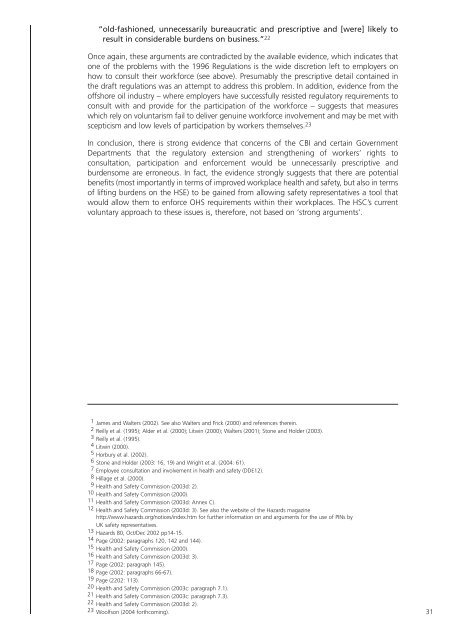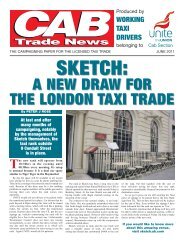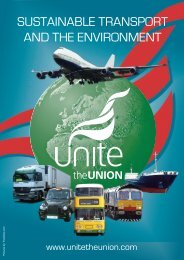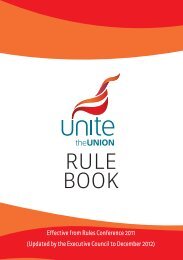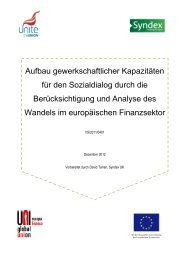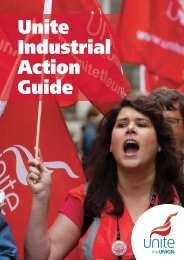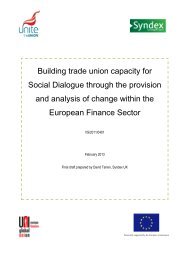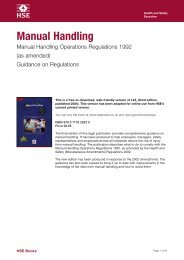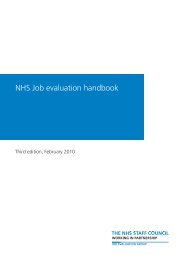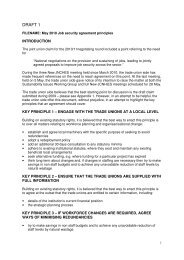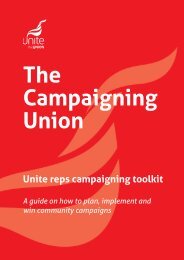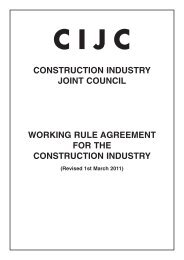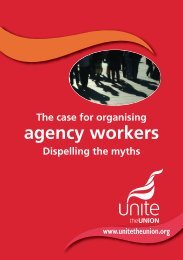Making Companies Safe - what works? (CCA ... - Unite the Union
Making Companies Safe - what works? (CCA ... - Unite the Union
Making Companies Safe - what works? (CCA ... - Unite the Union
You also want an ePaper? Increase the reach of your titles
YUMPU automatically turns print PDFs into web optimized ePapers that Google loves.
“old-fashioned, unnecessarily bureaucratic and prescriptive and [were] likely to<br />
result in considerable burdens on business.” 22<br />
Once again, <strong>the</strong>se arguments are contradicted by <strong>the</strong> available evidence, which indicates that<br />
one of <strong>the</strong> problems with <strong>the</strong> 1996 Regulations is <strong>the</strong> wide discretion left to employers on<br />
how to consult <strong>the</strong>ir workforce (see above). Presumably <strong>the</strong> prescriptive detail contained in<br />
<strong>the</strong> draft regulations was an attempt to address this problem. In addition, evidence from <strong>the</strong><br />
offshore oil industry – where employers have successfully resisted regulatory requirements to<br />
consult with and provide for <strong>the</strong> participation of <strong>the</strong> workforce – suggests that measures<br />
which rely on voluntarism fail to deliver genuine workforce involvement and may be met with<br />
scepticism and low levels of participation by workers <strong>the</strong>mselves. 23<br />
In conclusion, <strong>the</strong>re is strong evidence that concerns of <strong>the</strong> CBI and certain Government<br />
Departments that <strong>the</strong> regulatory extension and streng<strong>the</strong>ning of workers’ rights to<br />
consultation, participation and enforcement would be unnecessarily prescriptive and<br />
burdensome are erroneous. In fact, <strong>the</strong> evidence strongly suggests that <strong>the</strong>re are potential<br />
benefits (most importantly in terms of improved workplace health and safety, but also in terms<br />
of lifting burdens on <strong>the</strong> HSE) to be gained from allowing safety representatives a tool that<br />
would allow <strong>the</strong>m to enforce OHS requirements within <strong>the</strong>ir workplaces. The HSC’s current<br />
voluntary approach to <strong>the</strong>se issues is, <strong>the</strong>refore, not based on ‘strong arguments’.<br />
1 James and Walters (2002). See also Walters and Frick (2000) and references <strong>the</strong>rein.<br />
2 Reilly et al. (1995); Alder et al. (2000); Litwin (2000); Walters (2001); Stone and Holder (2003).<br />
3 Reilly et al. (1995).<br />
4 Litwin (2000).<br />
5 Horbury et al. (2002).<br />
6 Stone and Holder (2003: 16, 19) and Wright et al. (2004: 61).<br />
7 Employee consultation and involvement in health and safety (DDE12).<br />
8 Hillage et al. (2000).<br />
9 Health and <strong>Safe</strong>ty Commission (2003d: 2).<br />
10 Health and <strong>Safe</strong>ty Commission (2000).<br />
11 Health and <strong>Safe</strong>ty Commission (2003d: Annex C).<br />
12 Health and <strong>Safe</strong>ty Commission (2003d: 3). See also <strong>the</strong> website of <strong>the</strong> Hazards magazine<br />
http://www.hazards.org/notices/index.htm for fur<strong>the</strong>r information on and arguments for <strong>the</strong> use of PINs by<br />
UK safety representatives.<br />
13 Hazards 80, Oct/Dec 2002 pp14-15.<br />
14 Page (2002: paragraphs 120, 142 and 144).<br />
15 Health and <strong>Safe</strong>ty Commission (2000).<br />
16 Health and <strong>Safe</strong>ty Commission (2003d: 3).<br />
17 Page (2002: paragraph 145).<br />
18 Page (2002: paragraphs 66-67).<br />
19 Page (2202: 113).<br />
20 Health and <strong>Safe</strong>ty Commission (2003c: paragraph 7.1).<br />
21 Health and <strong>Safe</strong>ty Commission (2003c: paragraph 7.3).<br />
22 Health and <strong>Safe</strong>ty Commission (2003d: 2).<br />
23 Woolfson (2004 forthcoming). 31


